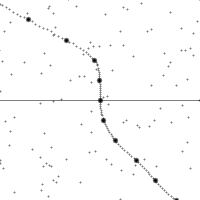User:JocK
Started contributing to Wikipedia (in earnest) June 2006. So far I have mainly contributed (and initiated)
I am a starter and much less a completer. As I have strong faith in the 'wiki process', I experience little thresholds in initialising new articles. I do post immature articles and love to see these grow and improve thanks to your contributions. When an article is in an early stage of development, I am less interested in details, spelling, lay-out, formatting, etc. This 'slopiness' does not mean that I have any tolerance for content that is factually incorrect.
WikiProjects
I participate in WikiProject Contract bridge, WikiProject Board and Table Games, WikiProject Mathematics, and WikiProject Physics.
Articles I've created
In order of creation. The bold titles refer to contributions that have escaped 'stub-status':
Beware of OR-fundamentalists
Some Wikipedia editors seem to take the
Personally, I strongly feel that the group of OR-fundamentalists are losing sight of the original intentions[2] of the no-OR policy, and are pushing Wikipidia in a wrong direction. However, I don't have the time nor the energy to keep combatting this. Let's see how thing develop. JocK 20:26, 28 April 2007 (UTC)
- ^ Yes, that indeed means that you would not be allowed to include in a Wikipedia article - say - the result 2,007*2,007 = 4,028,049, in case you have obtained this result in Excel and you can't find a reputable source for this specific multiplication result. Your argument that you have tested your Excel worksheet against published results for all squares up to 100*100 will not impress them...
- ^ Wikipedia's co-founder, Jimbo Wales, has described the origin of the original research policy as follows: "The phrase 'original research' originated primarily as a practical means to deal with physics cranks, of which of course there are a number on the Web. The basic concept is as follows: It can be quite difficult for us to make any valid judgment as to whether a particular thing is true or not. It isn't appropriate for us to try to determine whether someone's novel theory of physics is valid; we aren't really equipped to do that. But what we can do is check whether or not it actually has been published in reputable journals or by reputable publishers. So it's quite convenient to avoid judging the credibility of things by simply sticking to things that have been judged credible by people much better equipped to decide. The exact same principle will hold true for history." (Wales, Jimmy. "Original research", December 3, 2004)
Did you know...
- ... that a bridge-playing robot managed to defeat two reigning European bridge champions?
- ... that the self-teaching robotswere analyzed playing the game?
- ... that upon any amount above 43, but not 43?
- ... that in recent years the alcoholic beverage ouzo has been subject of intense scientific study?
- ... that due to the subtly non-local nature of quantum reality, apparent telepathy can be achieved in gamesbetween separated players ?
- ... that the preceding DYK - whilst on Wikipedia's once every 6 seconds?
- ... that you don't need to go through the hassle of writing a
And did you know ... that you can also suggest interesting facts from recently created articles?
Wikipedia, its strengths and weaknesses
An excellent essay on the history of Wikipedia, and how Wikipedia captures history: Roy Rosenzweig in The Journal of American History, Vol. 93, Number 1 (June, 2006), p. 117-46.
Interesting User-pages


- User:Rocchini : Lots of beautiful math-related graphics. I like his moving sofa animation!
- User:Oleg Alexandrov/Pictures : Some more nice math graphics.
- User:JasonHise : Animated 4D graphics.
- User:Tetracube : More 4D stuff.
- User:Michael Hardy : Originator of many great articles on math.
- User:Tomruen : A page with thought-provocative graphs.
- User:Cyp : Some more polyhedra. More interestingly, Cyp also appears to be the creator of two beautiful animations on Galilean and Lorentz transformations - see animations to the left and right:
Vertical direction indicates time. Horizontal indicates distance (only one spatial dimension is taken into account), and the thick dashed line is the spacetime trajectory ("world line") of the observer. The small dots indicate specific (past and future) events in spacetime.
The slope of the world line (deviation from being vertical) gives the relative velocity to the observer. Note how in both pictures the view of spacetime changes when the observer accelerates. In the Newtonian description these changes are such that time is absolute: the movements of the observer do not influence whether an event occurs in the 'now' (i.e. whether an event passes the horizontal line through the observer). However, in the relativistic description the observability of events is absolute: the movements of the observer do not influence whether an event passes the light cone of the observer. Notice that with the change from a Newtonian to a relativistic description, absolute time is no longer applicable: events move up-and-down in the figure depending on the acceleration of the observer.
- User:Fred Hsu Another stunning animation: a dynamic random dot autostereogram. (Have a look yourself: http://en.wikipedia.org/wiki/Image:Stereogram_Tut_Animated_Shark.gif)
Places I've been to
I've worked and lived in Europe, Asia, Africa and North America. Including visits and holidays, I have been to 34 nations spread over the same four continents:

|
|||||

|

|
||||
As part of my Wikipedia activities, I try to expand (or create) Wikipedia articles pertaining to the countries I visited.
Me and my activities in nine userboxes
| JocK enjoys playing bridge. |
| JocK comes from the Netherlands. |
| incl | JocK is a Wikipedia inclusionist. |
| OR | This user combats no-OR_fundamentalism. |
| This user is a physicist. |
| This user wastes far too much time editing Wikipedia. |
| This user participates in WikiProject Contract bridge. |
| This user enjoys playing poker. |

